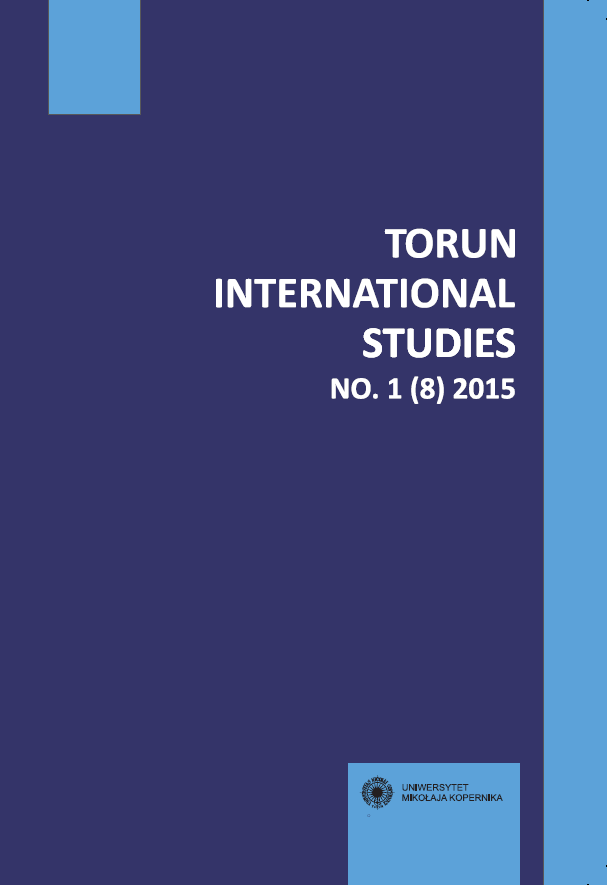National economic image and soft economic power evaluation
DOI:
https://doi.org/10.12775/TIS.2015.002Keywords
economic power, soft power, national image, webometric approach, economic information, economic performanceAbstract
The article provides a review of national economic image, brand, and soft economic power evaluation methods based on opinion polls or objective indicators. The author elaborates and tests a webometric method for evaluation of specific components of national economic image and soft power. National economic image is measured as the share of positive messages in total number of messages about economy of a country. Soft economic power is described as national economic image adjusted for absolute amount of positive economic information about a country. Various key words and expressions are used for web search query to analyze specific components of economic image (trade, inflation, finance, budget, quality, competitiveness, investment, business, corruption, corporate governance, wages, economic cooperation or conflicts, economic growth or crisis). The advantages and limitations of the suggested approach are discussed. The sample for testing the method includes Poland, Ukraine, Russia, Turkey, Romania, Germany, and Moldova. Germany and Poland have almost no major weaknesses, while Russia and Ukraine have almost no major strengths among economic image components. Germany is a soft power leader in the majority of areas, followed by Russia, Turkey and Poland. Ukraine, Romania, and Moldova can improve their image and soft power by better real economic performance and wider coverage of positive economic information about these countries.References
Anholt, S. (n.d.). The Good Country Index. Retrieved November 13, 2015, from http://www.goodcountry.org/index_intro
Cardoso, A. R., Guimaraes, P., & Zimmermann, K. F. (2010). Trends in Economic Research: An International Perspective: IZA Discussion Paper, 4785. Bonn: Institute for the Study of Labor. Retrieved November 13, 2015, from http://ftp.iza.org/dp4785.pdf
European Commission. (n.d.). Eurobarometer Surveys. Retrieved November 05, 2015, from http://ec.europa.eu/public_opinion/index_en.htm
European Commission’s Directorate-General for Internal Market, Industry, Entrepreneurship and SMEs, & TNS Political & Social Network. (2015). Preferences of Europeans towards Tourism: Flash Eurobarometer Report, 414. Retrieved August 21, 2015, from http://dx.doi.org/10.2873/632880
FutureBrand. (n.d.). Made in. The Value of Country of Origin for Future Brands. Retrieved November 05, 2015, from http://www.futurebrand.com/images/uploads/studies/cbi/MADE_IN_Final_HR.pdf
FutureBrand. (2015). Country Brand Index 2014-2015. Retrieved November 05, 2015, from http://www.mumbrella.asia/content/uploads/2014/11/CountryBrandIndex2014.pdf
Google. (n.d.). Google Ukraine. Retrieved November 08-09, 2015, from https://www.google.com.ua
Growth from Knowledge. (n.d.). Place Branding Research. Retrieved November 13, 2015, from https://www.gfk.com/Documents/GfK-Place-Branding.pdf
Hohn, K. H. (2011). Geopolitics and the Measurement of National Power: Dissertation zur Erlangung des Doktorgrades an der Fakultat Wirtschafts- und Sozialwissenschaften, Fachbereich Sozialwissenschaften der Universitat Hamburg. Hamburg: Universitat Hamburg. Retrieved February 06, 2015, from http://ediss.sub.uni-hamburg.de/volltexte/2014/6550/pdf/Dissertation.pdf
Nye, J. S. (2004). Soft Power: The Means to Success in World Politics. New York: Public Affairs.
The Pew Research Center’s Global Attitudes Project. (2015, August). Global Indicators Database. Retrieved November 13, 2015, from http://www.pewglobal.org/database/
Treverton, G. F. & Jones, S. G. (2005). Measuring National Power. Santa Monica, CA; Arlington, VA; Pittsburgh, PA: RAND Corporation. National Security Research Division. Retrieved November 13, 2015, from http://www.rand.org/pubs/conf_proceedings/2005/RAND_CF215.pdf
Whitney, C. B., & Shambaugh, D. (2009). Soft Power in Asia: Results of a 2008 Multinational Survey of Public Opinion. Chicago: The Chicago Council on Global Affairs.
Downloads
Published
How to Cite
Issue
Section
Stats
Number of views and downloads: 558
Number of citations: 0



